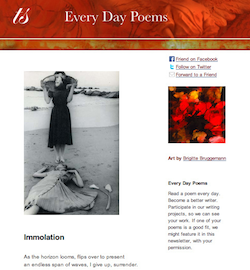What is poetry? A shot in some dark, a walk in some woods, a maker’s feel for the material at hand, an intuition of what is needed? Maybe some of these, maybe none? I don’t know; I really don’t. And the truth is, I don’t want to know what poetry is. Like the nature of God or the vast gulf between a great chocolate chip cookie and a merely good one. No technique can be taught to reproduce the results, and the mere posing of the question feels to me like a trespass.
Mythology is replete with stories of those who paid for mistrusting, misusing, or being overly entangled in this mysterium that governs the unmade world: Prometheus, Odin, Moses, Orpheus, Faustus, Frankenstein, Schrödinger’s cat. Because Occam’s solution—which might posit “a literary form whose basic unit is the line” and be done with it—fails to satisfy, and because we like prose poems, we are left only with poetic language with which to define poetry, the ineffable with more ineffability, which of course we learned in grade school should not be done. Only a poem can define poetry.
The end of art and science is never idle. Even when we ostensibly pursue knowledge for its own sake, we intend the production of a particular thing, even if it’s a better human being. Thus we should ask ourselves a more productive, question: “What is a poem?” (or if you are a different kind of maker, “What is a novel? What is a bridge? What is a knitted pot-warmer?”) It’s not that these questions do, or should, have definitive answers, but rather that they keep our posture toward the work—which defines its own limits—properly undefined. To know so surely what one is doing trades your laboratory for an assembly line.
But by asking of ourselves “What is a poem?” as we study and write, and of our poems “Is this a poem?” as we experiment and play with language, we keep ourselves in a state of ready puzzlement, leaving room for those energies we call poetry—which follow their own bidding—to find their way in. The magic of discovery, the gift of something new, can only follow upon such a practice of uncertainty. By trusting this source and testing it time and again, by refusing to say what is, and crucially what is not a poem, we keep ourselves poised for surprises, the provision of which must be (right?) the only reason one would care about poems in the first place. So the next time I’m tempted to answer such questions, to arrive at a state of understanding I think I deserve, I’ll stick my foot in that closing door and be content to say “I don’t know.”
Photo by Gemma Stiles, Creative Commons, via Flickr. Post by John Estes, author of Kingdom Come
Subscribe to Every Day Poems. Inbox peace. Monthly themes. Beautiful art.
- Poetry Prompt: In the Wild Secret Place - January 6, 2025
- Journeys: What We Hold in Common - November 4, 2024
- Poetry Prompt: My Poem is an Oasis - August 26, 2024

[…] What is poetry? A shot in some dark, a walk in some woods, a maker's feel for the material at hand, an intuition of what is needed? […]